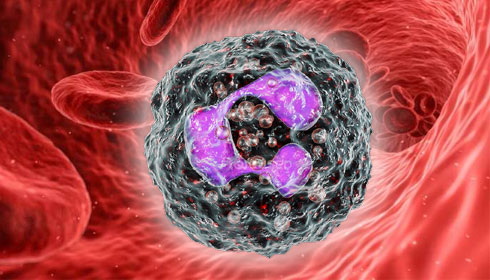
Neutrophils: The Unsung Heroes of Cancer Immunotherapy Revealed in a Surprising Discovery
In a groundbreaking study published in the journal Cell on March 5, 2024, scientists from the Shanghai Institute of Immunity and Infection (SIII) and Fudan University have uncovered a previously unknown level of complexity within neutrophil granulocytes, disproving the assumption that these immune cells are a simple and uniform population.
Using advanced single-cell RNA sequencing technology, the researchers examined individual neutrophil granulocytes from 143 patients with 17 different types of cancer. Contrary to previous assumptions, they discovered that neutrophil granulocytes can adopt at least ten highly specialized and distinct functional states related to inflammation, blood vessel formation and, most importantly, the presentation of antigens to activate potent cancer-killing T cells.
Expressing their surprise, Prof. ZHANG Xiaoming from SIII stated, "We were surprised to find such intricate complexity and divergent roles embedded within neutrophils, which have been overlooked for so long as a simple population." Prof. Zhang highlighted the newfound capacity of neutrophils to act as antigen-presenting cells, playing a crucial role in maturing and mobilising T cells against cancer. Moreover, the study revealed that the abundance of these antigen-presenting neutrophils correlates with improved patient prognosis across various tumour types.
The researchers investigated the mechanisms behind this antigen-presenting state and discovered that it can be activated by metabolic signaling of the amino acid leucine, which leads to subsequent epigenetic changes. Prof. ZHANG remarked, "We've uncovered a way to wake up an untapped army already living within our immune system. Strategically activating these neutrophil states or modulating their behaviour through metabolic or dietary means represents an entirely new paradigm to empower cancer immunotherapy."
The researchers conducted in vivo experiments to test the potential therapeutic benefits of their findings. The results were conclusive: administering antigen-presenting neutrophils or adjusting the leucine diet significantly improved the anti-tumor immune response in mice.
Furthermore, these treatments showed a significant improvement in the outcome of PD-1 checkpoint immunotherapy across various types of cancers. It is clear that these treatments have tremendous potential for enhancing cancer treatment and should be explored further.
Prof. GAO Qiang from Fudan University emphasised the transformative impact of the study, stating, "This completely changes how we perceive neutrophils in the context of cancer. Now we know we could harness the diverse hidden identities of neutrophils to strengthen the effectiveness of immunotherapies. We're thrilled to further explore the potential benefits of these newly uncovered mechanisms in clinics."
The newfound potential of neutrophils in cancer immunotherapy provides exciting and innovative approaches for the diagnosis and treatment of cancer. By targeting these cells specifically, researchers hope to develop more effective and personalized treatments for cancer patients. The findings from this study could pave the way for a new era of precision medicine, where treatments are tailored to individual patients based on their specific genetic and cellular makeup.